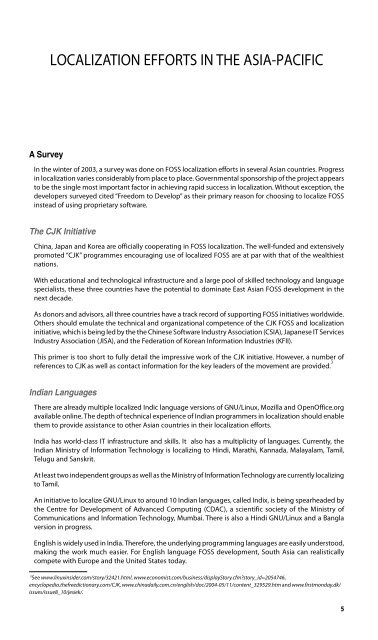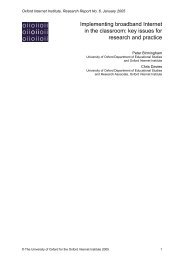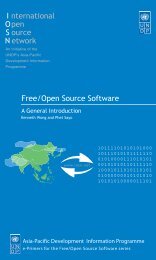LOCALIZATION EFFORTS IN THE ASIA-PACIFICA SurveyIn the winter of 2003, a survey was done on FOSS localization efforts in several Asian countries. Progressin localization varies considerably from place to place. Governmental sponsorship of the project appearsto be the single most important factor in achieving rapid success in localization. Without exception, thedevelopers surveyed cited “Freedom to Develop” as their primary reason for choosing to localize FOSSinstead of using proprietary software.The CJK InitiativeChina, Japan and Korea are officially cooperating in FOSS localization. The well-funded and extensivelypromoted “CJK” programmes encouraging use of localized FOSS are at par with that of the wealthiestnations.With educational and technological infrastructure and a large pool of skilled technology and languagespecialists, these three countries have the potential to dominate East Asian FOSS development in thenext decade.As donors and advisors, all three countries have a track record of supporting FOSS initiatives worldwide.Others should emulate the technical and organizational competence of the CJK FOSS and localizationinitiative, which is being led by the the Chinese Software Industry Association (CSIA), Japanese IT ServicesIndustry Association (JISA), and the Federation of Korean Information Industries (KFII).This primer is too short to fully detail the impressive work of the CJK initiative. However, a number ofreferences to CJK as well as contact information for the key leaders of the movement are provided. 3Indian LanguagesThere are already multiple localized Indic language versions of GNU/Linux, Mozilla and OpenOffice.orgavailable online. The depth of technical experience of Indian programmers in localization should enablethem to provide assistance to other Asian countries in their localization efforts.India has world-class IT infrastructure and skills. It also has a multiplicity of languages. Currently, theIndian Ministry of Information Technology is localizing to Hindi, Marathi, Kannada, Malayalam, Tamil,Telugu and Sanskrit.At least two independent groups as well as the Ministry of Information Technology are currently localizingto Tamil.An initiative to localize GNU/Linux to around 10 Indian languages, called Indix, is being spearheaded bythe Centre for Development of Advanced Computing (CDAC), a scientific society of the Ministry ofCommunications and Information Technology, Mumbai. There is also a Hindi GNU/Linux and a Banglaversion in progress.English is widely used in India. Therefore, the underlying programming languages are easily understood,making the work much easier. For English language FOSS development, South Asia can realisticallycompete with Europe and the United States today.3See www.linuxinsider.com/story/32421.html, www.economist.com/business/displayStory.cfm?story_id=2054746,encyclopedia.the<strong>free</strong>dictionary.com/CJK, www.chinadaily.com.cn/english/doc/2004-05/11/content_329529.htm and www.firstmonday.dk/issues/issue8_10/jesiek/.5
6 ❘ FREE/OPEN SOURCE SOFTWARE: LOCALIZATIONThaiLocalization of FOSS in the Thai language was started in 1993 by Thai students in Japan in an effort to useThai in Unix environments. Later, a similar movement commenced in Thailand. These two movementsmerged and Linux TLE and the Thai Linux Working Group were launched in 1999. However, the movementwas limited to a small community until mid-2001 when the Thai version of OpenOffice.org, dubbedPladao and sponsored by Sun Microsystems (Thailand), was announced to the public. Documentation isbeing carried out by private publishers who, in exchange, will retain the copyright on their work for latersale to the public in the form of books and manuals.Only 10 individuals are actively involved in the project at this time, with development resources providedby a combination of private companies and government.Thai developers are using GNU Compiler and Tools for modifying GNU/Linux, Mozilla’s “Bugzilla” for defecttracking, and CVS for version and source control. In addition, OpenOffice.org, a productivity suite, isbeing localized for Thai users.The primary difficulties the Thais are experiencing include lack of feedback from users, lack ofdocumentation, and conflicts with other Thai localization projects because of a lack of coordination andstandards.The Thais intend to roll out the software for both the private sector and public institutions, but are still inthe planning stage at this time. The team has not yet seen a high-profile effort to promote the use ofFOSS in Thailand. This may change in the near future, depending on government and private funding. Incomparison to the CJK efforts, Thailand has fewer developers, less money, and less outside interest dueto the size of its market. Other Thai localization projects are discussed on pages 7-10.VietnameseFOSS localization to the Vietnamese language began in 1998, primarily as an individual effort by anenthusiast. Today, there are between 20-50 people working on the project. They are volunteers, providingtheir resources and time for <strong>free</strong>, and all are using FOSS tools for the work. But even with the number ofindividuals currently involved, there are not enough people to perform all of the necessary work.Vietnamese localizations of GNU/Linux, Gnome, KDE, XFCE, Fluxbox, OpenOffice.org, Mozilla, XMMS,GnuCash, Gaim and Knoppix are in progress.Plans for introducing the software to the Vietnamese people include the publication of books, formationof user groups in major cities, and provision of the software to private and public institutions. Already,there has been some effort to promote the use of FOSS in secondary schools, universities and governmentoffices. Recently the government adopted a FOSS policy.MalayThe Malaysian Institute of Microelectronic Systems (MIMOS) has launched a Web site to document projectsin FOSS within Asia with links to key resources. MIMOS’s goal is to localize key applications into thenational language, Bahasa Melayu. MIMOS has already developed a local language GNU/Linux GUI andopen source applications for the government. Two other localization projects are GNOME, led by HasbullahBin Pit, and OpenOffice.org, spearheaded by MIMOS.KhmerThe Khmer Software Initiative has an ambitious though under-funded plan to localize FOSS for Khmerspeakers in Cambodia and elsewhere. In addition to a localized version of the GNU/Linux user interfaceand some applications, they intend to create a development library, complete documentation both onlineand in print, and specialized training materials for developers and end users. It is not known how manyindividuals are working on the project currently.As elsewhere, the Khmer team envisions providing the software to both private and government users.A publicity campaign is planned and the developers expect significant support from the internationaldevelopment community to complete much of the work.
















